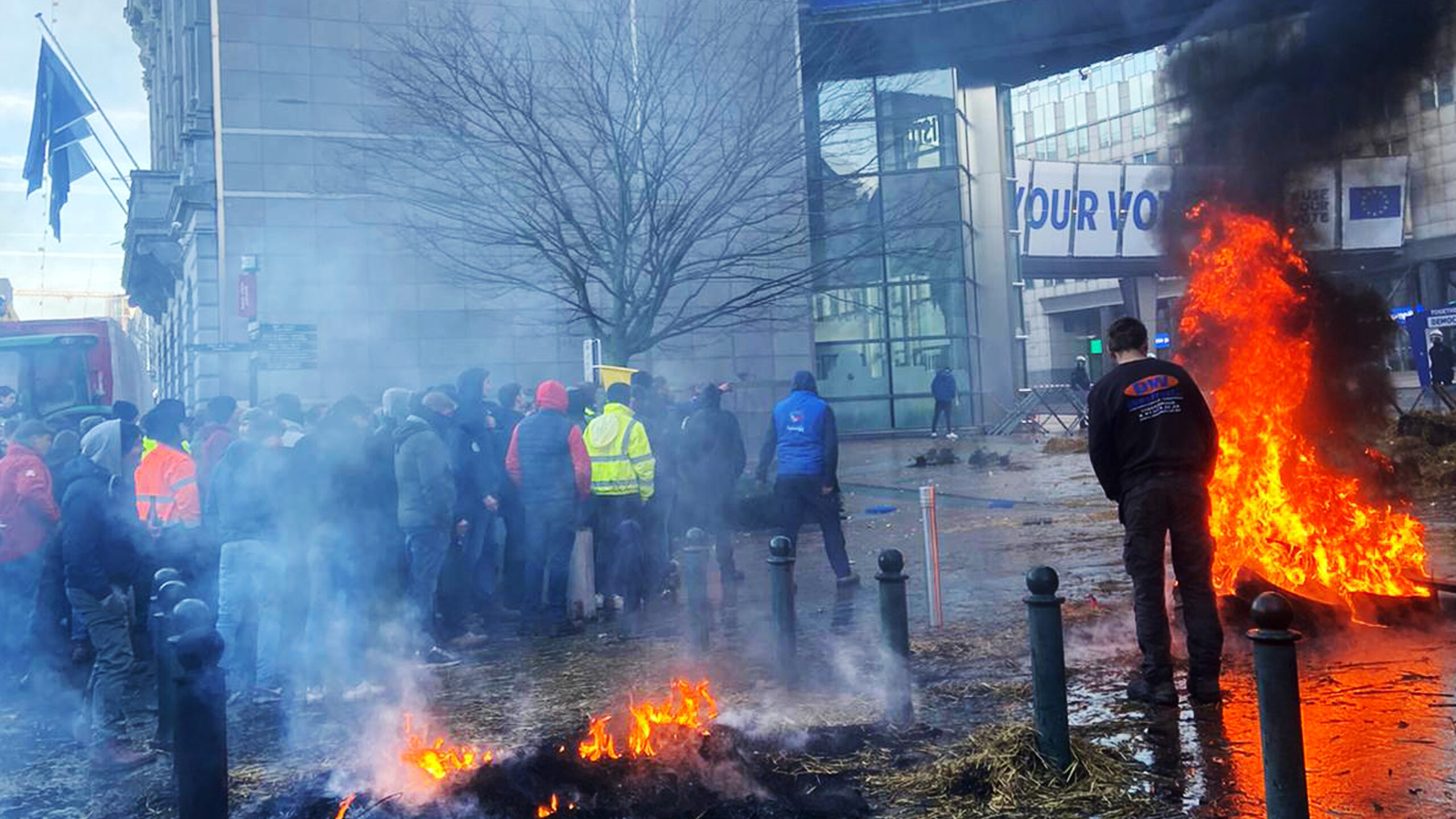
Editor’s note: finance for farmers, flames and firecrackers

The latest edition of our Sustainable Views newsletter
Dear reader,
Heads of state are in Brussels today ostensibly to discuss the EU budget and Ukraine, but there is only one story in town — and that’s the farmers’ protests. There is no way to avoid the subject — the roads around the EU quarter are blocked with tractors and a fire burns threateningly outside the European parliament. The air is thick with the smoke of burning diesel fuel and firecrackers ring out like shots.
The farmers are a disparate bunch. A handful stand provocatively close to the flames, cheering when the police turn on the water cannons to dampen the flames and the high tensions. Others look less convinced by the aggression. But the message from them all is clear — they want change.
However, in the face of such protests (which are also happening in France, Germany, Spain and Italy), policymakers are taking decisions that will do little, if anything, to deal with the real problems, and that will likely make life more difficult for farmers in the future. Yesterday, the European Commission announced it was suspending a requirement of the Common Agricultural Policy, the EU farm subsidy scheme, that demands farmers set aside a certain amount of land for nature.
Farmers won’t be able to do anything they want with this land, they will have to plant nitrogen-fixing crops, such as lentils or peas without pesticides, to receive their farm payments. But the decision sends the message that environmental measures are at least partly responsible for creating the problems facing farmers, when the opposite is true.
Extreme weather because of climate change is one of the biggest challenges farmers are dealing with. “Losses specific to the agriculture sector account for more than 60 per cent of drought-linked losses, or around €5bn annually,” says an EU report from April 2023. Tinkering around the edges of a policy that still essentially rewards the biggest farms for producing significant amounts of bulk foods will do nothing to help farmers manage these impacts.
French President Emmanuel Macron is expected to speak to European Commission president Ursula von der Leyen this morning in the margins of the EU summit, and will doubtless encourage her to do more of the same. But the temptation to roll back on domestic, European and international climate and nature commitments should be avoided, including for the sake of farmers and food production.
There is no shortage of models outlining the change that is necessary and case studies that concretely demonstrate how a farming transition can be implemented. They all show that key to a successful agricultural transition is investment. A report published earlier this month by the World Economic Forum and consultancy Bain & Company estimates that global climate investment in food systems must increase 15 times — from around $20bn to roughly $300bn-$350bn a year — to meet the expected annual costs of transformation over the next decade. In other words, rolling back money for environmental measures is not the way to go.
Another important point highlighted in the report, and by other research, is the need for partnerships between all actors — farmers, policymakers and investors — backed by financial support. “Capital and capabilities must also be co-ordinated and deployed more effectively to address economic, technical and social barriers to farmer adoption,” it states.
The commission has begun its so-called strategic dialogues with the food and farming sector, but these are limited in scope and the EU’s thinking around financing farming remains woolly. A central issue, as the EU once again starts discussions on CAP reform, is how the scheme’s annual €386.7bn budget can be used to enable farmers to face the real challenges of today — including making a decent living in the face of the climate and biodiversity crises.
It is not just the EU farming sector that looks set not to play its role in helping the union meet its climate targets. Analysis by the European Climate Neutrality Observatory shows proposals from five EU member states — Hungary, Italy, the Netherlands, Spain and Sweden — are not ambitious enough to deliver 2030 emissions reduction targets. The report singles out renewable hydrogen as a sector where it is unclear how countries will meet paper targets and describes plans for carbon capture and storage as “vague and contradictory”.
The UK, meanwhile, needs to get training more than 4mn workers if people are to have the necessary skills for the net zero transition, according to a report by Bain & Company.
Until tomorrow,
Philippa
Philippa Nuttall is the deputy editor of Sustainable Views
Similar Articles

Editor’s note: curtains close on European parliament

Editor’s note: business as usual, deregulation or climate-consistent laws?


